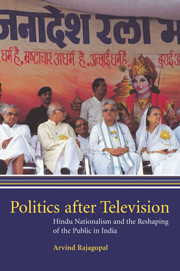Book contents
- Frontmatter
- Contents
- Acknowledgments
- Introduction
- 1 Hindu nationalism and the cultural forms of Indian politics
- 2 Prime time religion
- 3 The communicating thing and its public
- 4 A “split public” in the making and unmaking of the Ram Janmabhumi movement
- 5 Organization, performance, and symbol
- 6 Hindutva goes global
- Conclusion
- Appendix: Background to the Babri Masjid dispute
- Notes
- Select bibliography
- Index
Appendix: Background to the Babri Masjid dispute
Published online by Cambridge University Press: 22 September 2009
- Frontmatter
- Contents
- Acknowledgments
- Introduction
- 1 Hindu nationalism and the cultural forms of Indian politics
- 2 Prime time religion
- 3 The communicating thing and its public
- 4 A “split public” in the making and unmaking of the Ram Janmabhumi movement
- 5 Organization, performance, and symbol
- 6 Hindutva goes global
- Conclusion
- Appendix: Background to the Babri Masjid dispute
- Notes
- Select bibliography
- Index
Summary
On 2 February 1986, then-Prime Minister Rajiv Gandhi, speaking on the occasion of Pope John Paul II's visit to New Delhi, declared, “India, a land of religion, believes in according equal reverence and respect to all faiths.” What the Pope understood from his words may not have been quite what Rajiv Gandhi had in mind. The latter had just completed a remarkable exercise in the practice of religious equality, placating the demand of a group of influential, conservative Hindus, to counterbalance a favor he had granted orthodox Muslim opinion the previous year.
Only the previous day, an extraordinary court judgment had been passed at his government's behest, favouring a Hindu rights lobby. Justice Krishna Mohan Pandey's judgment in Faizabad District Court declared the unrestricted right of worship for Hindus at a mosque, the Babri Masjid in Ayodhya. The judgment was passed with scarcely any comment on the voluminous litigation on the issue. For decades, Muslims had protested the encroachment of Hindu idols in their mosque, and against the closure of the structure. A year ago Gandhi had, with an Act of Parliament, over-ruled the Supreme Court's decision to order alimony payments for a divorced Muslim woman, Shah Bano. The Muslim community itself would decide on such matters hereafter, according to the Muslim Women's Bill that was passed. The decision created an unprecedented storm of controversy around issues of minority rights, and the political character of favors granted minority communities.
- Type
- Chapter
- Information
- Politics after TelevisionHindu Nationalism and the Reshaping of the Public in India, pp. 284 - 291Publisher: Cambridge University PressPrint publication year: 2001

